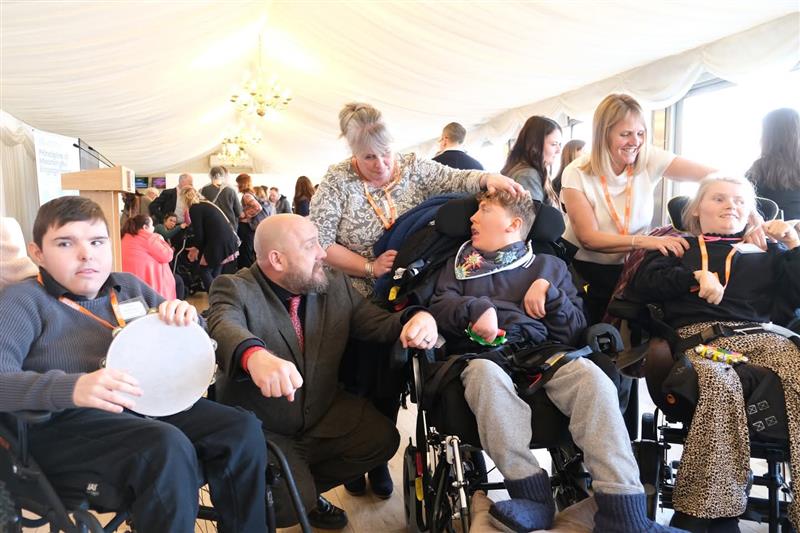Introduction (Part 1)
On 27th March 2025, the Challenging Behaviour Foundation hosted the What Matters to Me Online Launch Event. The aim of this launch was to share learning from the three-year What Matters to Me project that involved directly engaging with young people with severe or profound and multiple learning disabilities, and using their experiences, preferences and views to influence policy. Over 100 professionals and family carers attended and contributed through discussions and interactive activities. During the launch, four films containing the project learnings were broadcast and further best practice examples were shared. The CEO of the CBF Jacqui Shurlock welcomed attendees and chaired the event.
Family Carer Experience (Part 2)
Marie is mum to Aimee, one of the eleven young people who participated in the project, and she spoke about their families’ experience of the project and why it is so important that Aimee is at the very centre of this type of engagement. Marie gave her speech at the in-person event held at the House of Commons on 13th March and kindly agreed to record her speech so it could be shared to those attending the online event.
What Matters to Me: A Project Overview
The Overview film highlights how the What Matters to Me project used creative engagement methods to gather the views of young people who have severe or profound and multiple learning disabilities. This film hears from family carers whose relatives participated in the project and outlines the project findings.
Consent and Best Interest (Part 3)
Taylor Anderson, Project Lead, delivered a short presentation explaining the consent and best interest process used for the What Matters to Me project, and shared a new resource which is now available for download.
How did we find out what matters? (Part 4)
Taylor Anderson shared details of the practical steps that were taken to carry out the direct engagement sessions with the young people and their families. The Principles of Engagement film was shown which explores the six principles identified as essential to carrying out successful and meaningful engagement with young people with severe or profound and multiple learning disabilities.
Using Creative Methods of Engagement (Part 5)
Professor Jill Bradshaw from the University of Birmingham shared how to use creative methods to communicate and engage with people with severe or profound and multiple learning disabilities.
Circles of Influence (Part 6)
Taylor Anderson spoke about the importance of using the experiences, preferences and views of young people with severe or profound and multiple learning disabilities to have an influence. The Circles of Influence film was shown, which presents a case study example of how learning from the project was used to influence a service-wide change in the delivery of hydrotherapy sessions at Demelza hospice.
Lewisham Speaking Up and Entelechy Arts (Part 7)
Ellie Spirrett, from Lewisham Speaking Up (a rights based self-advocacy organisation), shared information about their ‘Ambient Jam’ sessions, organised in partnership with Entelechy Arts. These sessions aim to bring together people with profound and multiple learning disabilities with local MPs, councilors and other professionals, giving them a safe and inclusive space to express themselves freely.
Transition Findings (Part 8)
Coral Histed, Adult Policy Lead at the Challenging Behaviour Foundation, shared the findings from the What Matters to Me project’s topic of transition (from child to adult services). The transition film details the eight findings identified from direct engagement with the young people, and engagement with their families and support circles, and explains the importance of these findings for young people with severe or profound and multiple learning disabilities.
What Matters to Me – Resources (Part 9)
Taylor Anderson shared with attendees the future resources being finalised following the project direct engagement. A toolkit aimed at providing practical materials and resources that can be used by both professionals and families to consult and engage with people with severe or profound and multiple learning disabilities is being finalised, and during the online session, attendees had the opportunity to share what they thought would be useful in such a resource.

